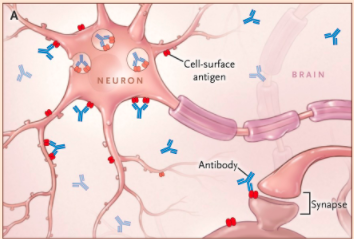Josep Dalmau, M.D., Ph.D., and Francesc Graus, M.D., Ph.D.
March 1, 2018 N Engl J Med 2018; 378:840-851 – DOI: 10.1056/NEJMra1708712
Antibody-mediated encephalitides constitute a group of inflammatory brain diseases that are characterized by prominent neuropsychiatric symptoms and are associated with antibodies against neuronal cell-surface proteins, ion channels, or receptors (Table 1). Common clinical features include a change in behavior, psychosis, seizures, memory and cognitive deficits, abnormal movements, dysautonomia, and a decreased level of consciousness. There are, however, no systemic manifestations other than autonomic dysfunction, and this group of diseases is separable from traditional autoimmune disorders such as systemic lupus erythematosus, which may affect the nervous system. Also separate from this group of antibody-mediated encephalitides are several disorders, some of which are paraneoplastic, such as cerebellar degeneration, neuromyelitis optica, and stiff-person spectrum diseases, that are associated with antibodies against neuronal or glial cell-surface antigens but that are rarely associated with the aforementioned symptoms.
See full review article at:
http://www.nejm.org/doi/full/10.1056/NEJMra1708712?query=featured_home


